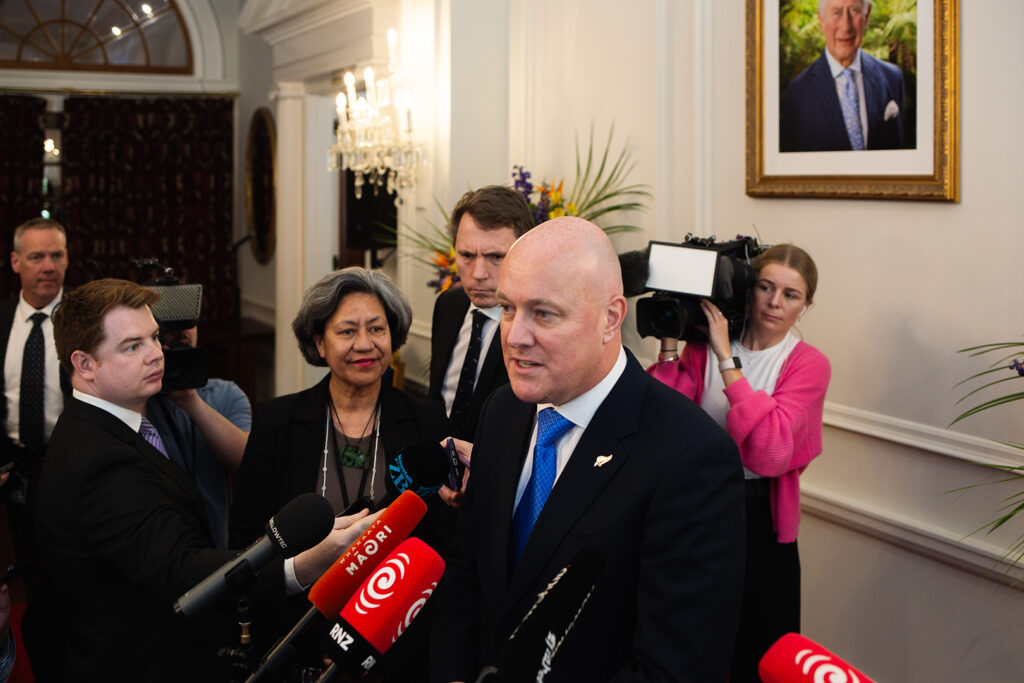Luxon: Māori Ward Decisions Show ‘Local Democracy in Action’ But Low Turnout a Concern
Description

Prime Minister Christopher Luxon says the outcome of the Māori ward referenda reflects “local democracy in action”.
Speaking at his post-Cabinet media stand-up on Monday, the Prime Minister congratulated communities that voted to keep their Māori wards but said those who chose to remove them were equally entitled to do so.
“For those areas that have wanted to positively affirm that they want to keep their Māori wards, fantastic. For those that have decided they don’t want to, our whole thing was it shouldn’t be mandated from Wellington. It should be a decision made by local communities,” Luxon said.
“Our view has been that’s a decision for local communities. That’s what we’ve always argued – localism and devolution. If they’ve made a decision to keep it, fantastic. If they’ve made a decision to remove it, that’s their call and their choice as well.”
The comments come after 42 councils held binding referenda on Māori wards during the 2025 local elections. Nationally, 52.25 percent of voters supported keeping Māori wards, while 48.34 percent voted to remove them. However, under the council-by-council system, 25 councils voted to abolish Māori wards and 17 chose to retain them; meaning Māori representation will be lost in many districts despite a national majority of support.
Turnout Remains a Worry
Luxon also expressed concern about low voter turnout, saying the health of local democracy depends on engaged voters and strong leadership from candidates.
“You’ve got to have candidates that have a compelling vision of what they want to do and get voters to come out and actually positively affirm that vision,” he said.
“New Zealanders need to register and vote. If you care about democracy, it’s a pretty precious thing and you don’t want to take it for granted.”
Nationwide, turnout in this year’s local elections averaged between 35 and 40 percent, with many councils reporting participation below half of those enrolled.
In Ōtorohanga, only 43 percent of eligible voters took part in the Māori ward poll, while South Taranaki recorded just 39.7 percent turnout. Both councils voted to remove Māori wards despite having established them for the first time in the previous term.
Luxon said improving civic participation would require communities to “step up” by fielding candidates with clear ideas for their cities and districts, and by voters valuing their right to vote.
“We’ve got to make sure we’ve got candidates that have got vision for where they want to take a city. We want empowered local government to get on with it — but we’ve also got responsibilities for voters to show up and vote.”
Māori Impact and Ongoing Review
Māori observers note that while the Prime Minister praised local decision-making, the council-by-council approach produced uneven outcomes, with Māori wards retained mainly in urban centres such as Wellington, Hamilton, Rotorua and Hutt City, but removed from much of regional and rural Aotearoa.
Luxon confirmed that Ministers Paul Goldsmith and Simeon Watts are working with Local Government New Zealand to review how future local elections are run, including whether the Electoral Commission should oversee them. He said improving consistency and accessibility would be part of that discussion.
“I’m very open to that,” Luxon said. “Those are conversations that have already started. I think we do need to look at the actual mechanism by which we run the elections and the involvement of the Electoral Commission.”
Key Figures
Councils holding referenda | 42 |
Councils voting to retain Māori wards | 17 |
Councils voting to remove Māori wards | 25 |
Votes to retain | 416,179 (52.25 %) |
Votes to remove | 385,067 (48.34 %) |
Average turnout | 35–40 % |
Example turnout (Ōtorohanga / South Taranaki) | 43 % / 39.7 % |
At a national level, more voters backed Māori wards than opposed them.
But under the localised system the majority of councils will now remove them — leaving Māori representation stronger in the cities, and fading in many regions of Aotearoa.





